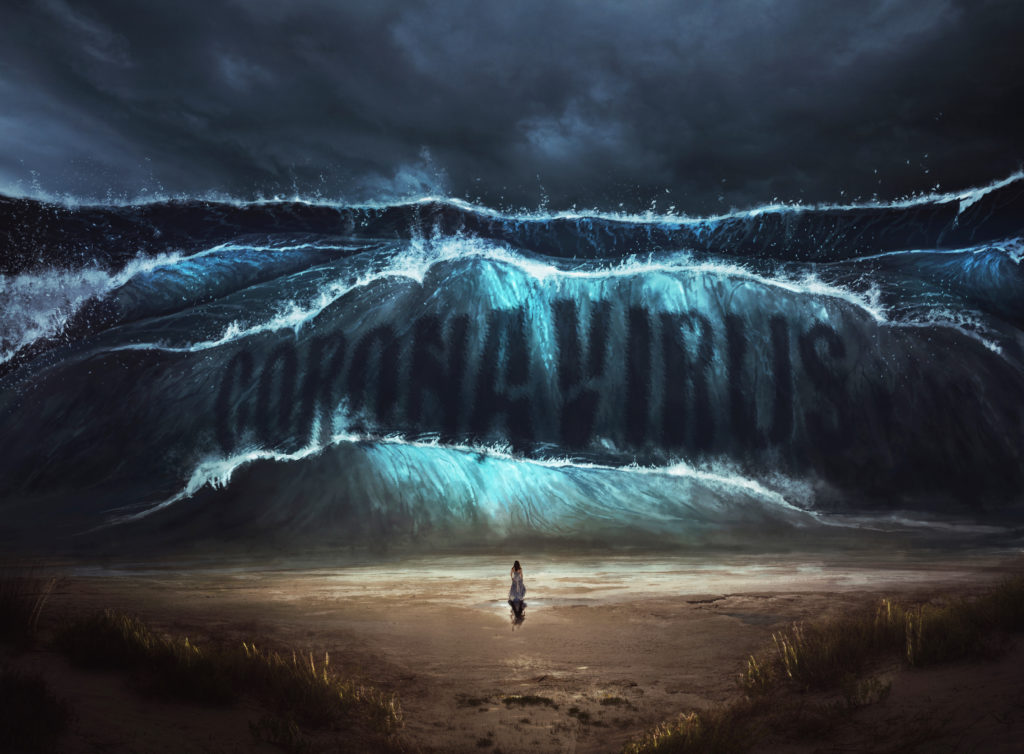
So, now the World Health Organization has declared what many of us have known for weeks – COVID-19 or the coronavirus – is, in fact, a global pandemic. It is not a hoax, it is not media hype. It’s the real deal, barreling down on us, impacting life as we know it.
Yesterday felt more like 9/11 than any day I can remember since my radio career began more than four decades ago. The NAB cancelled its huge Las Vegas conference, and AllAccess postponed its WorldWide Radio Summit scheduled for just two weeks from today. Like with SXSW and Coachella, Gordon Smith and Joel Denver had no choice under the circumstances.
Our lives are changing…rapidly. Yesterday, the NCAA announced the March Madness Tournament will be closed to public spectators. And last night, the NBA 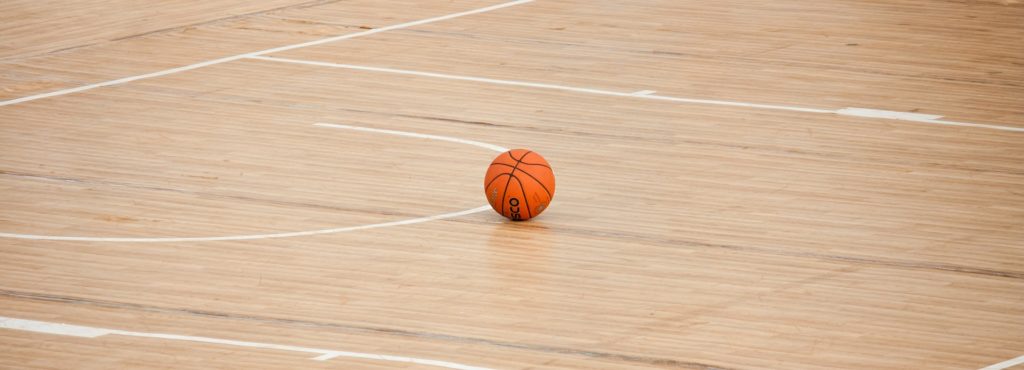 suspended its season until further notice when it was discovered Utah Jazz all-star center Rudy Gobert tested positive for the virus.
suspended its season until further notice when it was discovered Utah Jazz all-star center Rudy Gobert tested positive for the virus.
Will the NHL be next? And what about the start of the Major League Baseball season?
It’s looking more and more like big gatherings may be postponed or cancelled altogether. Many music radio stations are involved in concert ticket giveaways and station festivals. This changing landscape ought to prompt a marketing meeting before the weekend to discuss how this pandemic changes all that. There’s not much value in giving away tickets to an event that will probably get cancelled. Plus, the optics are bad, making a sponsor station sound out of touch with what’s going on. Never a good thing.
This situation feels very much unlike other disasters that have impacted the U.S. – wildfires, hurricanes, tornadoes. This one is approaching us like a slow-moving tidal wave. We know it’s coming, it’s trouble, and we’ve known about it for some time now. And in spite of that, we seem woefully unprepared to deal with it.
Part of the issue, as we’ve learned, is there is precious little data with which to go on. For reasons we may not understand for some time, the U.S. has been especially slow to test. And as us radio people know, trying to map out a complex strategy without the benefit of research usually doesn’t work out very well.
Despite the work of the CDC, Health & Human Services, and now Vice President Pence, it’s clear that “community spread” is happening locally – in Seattle, in New Rochelle, and soon in other places without much warning. As we’ve already seen, while federal help is wanted and needed, it is mayors and governors leading the charge, often without much guidance or a playbook.
And that should be a clue to those of us in radio about how this disaster will need to be covered. Because while SiriusXM can launch a Tom Petty channel that coves the life and times of that artist, their dedicated coronavirus channel (121, to be exact) is at best a generic resource, designed to cover COVID-19 on a large, national scale. The same is true with many of the podcasts that are springing up.
On-demand is great, until you hit a real-time crisis. And that’s precisely where we are right now.
Live & local.
This is one of those times when I feel fortunate I’ve lived through some of these existential crises before. Jacobs Media worked closely with our clients to get past 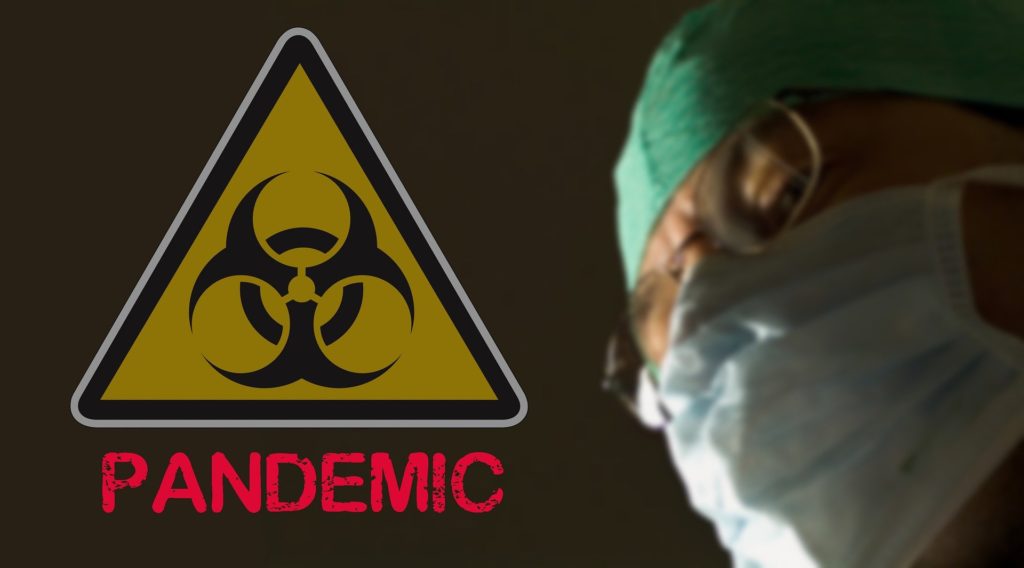 9/11. That’s when we started doing our stakeholder web surveys, the first of which was launched just a few days after the Twin Towers were leveled. It provided us with instant feedback on how radio listeners were thinking and feeling. And it changed our company.
9/11. That’s when we started doing our stakeholder web surveys, the first of which was launched just a few days after the Twin Towers were leveled. It provided us with instant feedback on how radio listeners were thinking and feeling. And it changed our company.
And then the financial crisis of 2008-09. We did our best to provide guidance in the face of that adversity. But let’s face it – music stations weren’t exactly in position to cover either of these disasters. That’s why so many turned over their airwaves to television coverage on September 11, 2001. And why coverage of the Great Recession was primarily left to television, financial news channels, print media, and news/talk radio stations.
This one’s different. It’s a pandemic, all right, and national leadership is important. We need to learn how to cope with the eventualities of the coronavirus crisis, whether it’s making our own hand sanitizer or better understanding how to protect our families, as well as those who are at the greatest risks. Anyone with a elderly relative in a senior living situation is wondering about their health and welfare.
Thankfully, online resources are improving rapidly. A good example is the CDC’s page, but there will be many others that crop up before long. This generic, national information is essential, of course, but after you learned how to wash your hands and disinfect your house, most people’s thoughts will be turning to their communities.
It feels like the issues and concerns that have many unsettled are happening right in their hometowns:
What schools are closed?
Which local sporting events have been cancelled? And will there be crowd size limits?
What businesses have closed or instructed their staffs to work out of their homes?
What local events are still taking place? And which ones have been cancelled?
How are the local hospitals coping with the impending influx of new patients?
Live & local.
That’s been the official broadcast radio mantra for years now, even though many companies and even more stations have gravitated away from its core principles. Voicetracking, syndication, and other cost-savers have created more generic-sounding radio stations. That doesn’t mean they haven’t been successful, of course. But when it comes to covering the local impact of COVID-19 in a meaningful way, many stations don’t have a plan in place, nor the infrastructure to do much about it.
Simply put, if you don’t have the horses, you’re not going to run a competitive race.
Many music stations are going to be providing a soundtrack to our angst-ridden world as long as this crisis persists. That’s not necessarily a bad thing. As we know from our Techsurveys, some radio brands are designed to do just that – provide escape and companionship, while helping buoy the audience’s spirits.
But for many other stations, there are resources and the willingness to step up and make a difference for your listeners and your community.
Radio Ink detailed Entercom’s news and information group’s activities. As you would expect for stations in that format, coverage is robust and will most likely be ramping up.
But what about music stations – especially in markets most impacted by this crisis?
I received a tweet from KISW on Wednesday, promoting Washington Governor Jay Inslee’s press conference on what Seattle is doing to face its unique COVID-19 challenge on the station’s Facebook page. Usually, that space is reserved for updates on upcoming concerts at the Showbox, Ozzy’s health, or where “Rockaholics” can purchase Men’s Room Red.
But not now. Things have changed, and stations like KISW must serve their audiences in entirely different, and more meaningful and relevant ways.
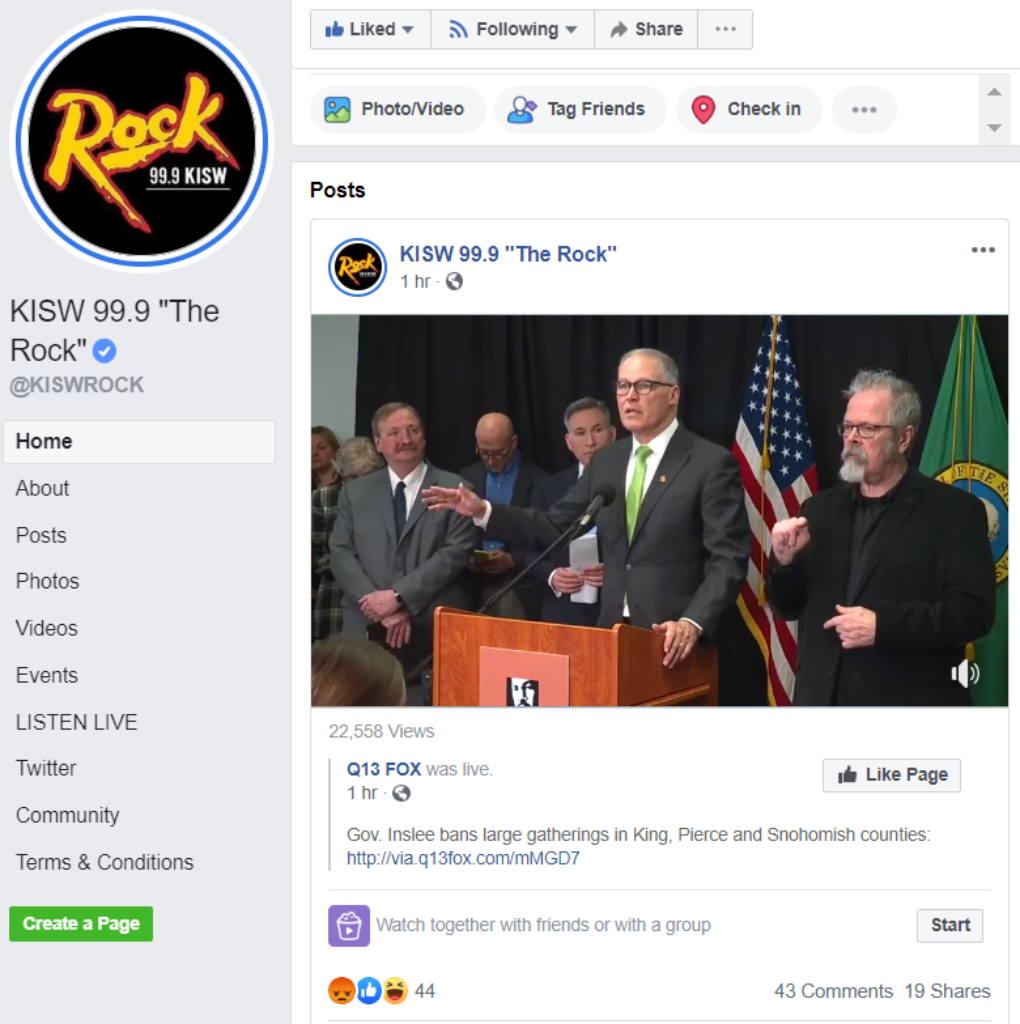
It’s a whole new day.
But it could be radio’s day to shine. And as we know all too well, we’re a traditional media platform that could use a chance to reprove its mettle by stepping up and serving its communities, particularly in this time of need.
That’s true for commercial, public, and Christian radio stations. We’ve talked about the former, but public radio stations have their work cut out for them, too. All the great programming from NPR and other networks won’t matter much to people in Oklahoma City or Orlando trying to figure out how to navigate their communities. “All Things Considered” and the “BBC News Hour” are wonderful shows, but public radio stations will have to step up their local coverage in order to be effective problem-solvers in this crisis.
There’s also a special place for Christian radio, tasked with providing inspiration, faith, and hope during the best – and worst of times. How that translates to COVID-19 coverage is a question I’ll leave to the great programmers in that format. But suffice it to say, just playing songs anyone can download from Spotify and put on a playlist isn’t going to distinguish anyone.
I want to show you something you haven’t seen from the upcoming Techsurvey 2020. We wanted to learn whether there is a gap between radio’s actual weekly reach as reported by Nielsen (and every broadcast radio CEO) versus the audience’s perception of the same metric.
Of course, our survey doesn’t represent anything close to the overall U.S. population. In fact, it is mostly comprised of radio fans, 46,000 strong this year, largely culled from radio station databases, and to a lesser extent, social media pages. These are people who, by and large, are drinking the radio Kool-Aid.
So, we know the 92% Nielsen figure, but what percentage of the population does the audience think radio reaches?
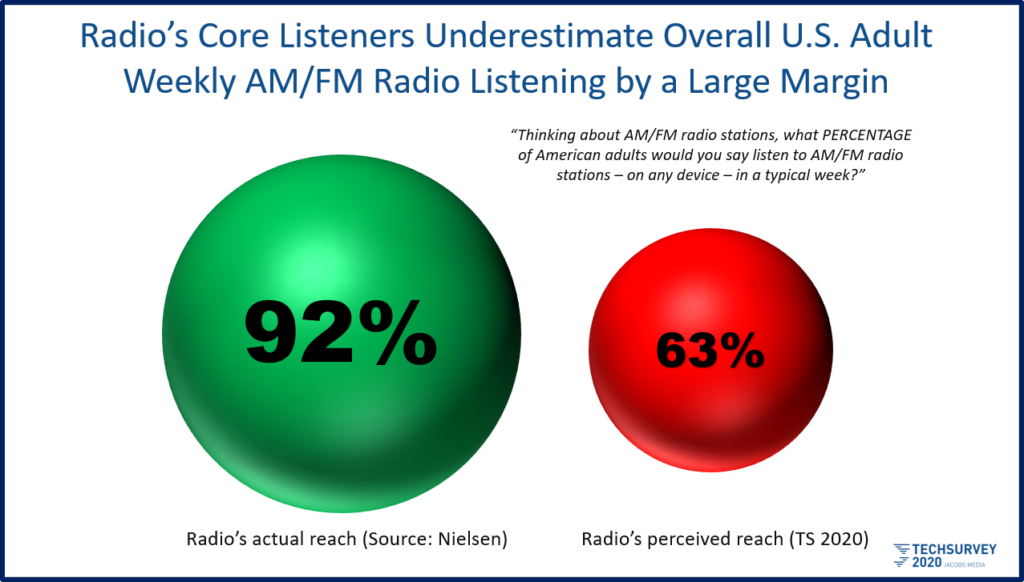
When our radio fans believe that AM/FM stations reach fewer than two-thirds of adults in this country, you can only imagine what the rest of the population must think. Or media buyers for that matter.
This speaks directly to broadcast radio’s perceptual erosion over the past decade or two. While radio’s usage metrics are actually pretty good, considering the quantity and quality of audio competition from satellite, streaming, podcasts, and the like, many people don’t believe the medium is all that healthy. As our data shows, many feel broadcast radio in the U.S. isn’t anywhere near as healthy as it is.
So, what a perfect time to for a little carpe diem action – seizing the moment, stepping up, and reminding consumers, the advertising world, and local communities just how important radio is in their lives; why “live & local” isn’t an empty, unkept promise, but a genuine commitment to lean into this crisis and do precisely what broadcast radio is supposed to do.
I’d like to believe broadcasters are having these meetings and think sessions. And not just to plot out how to keep stations on the air when talent can’t get inside their radio studios. Or how to make sure all that inventory actually runs.
Yes, those are legitimate concerns, but the bigger win, the greater hope is that broadcasters jump into this fire with both feet and provide the type of service that only local radio can.
Radio chieftains often complain we need to do a better job telling our story. Here’s the chance to write a whole new story – one that won’t require a PR team, but instead, a story people will be talking about for years.
This is not the time to be on-demand. It is the moment when real-time matters.
Live & local.
We have launched a web page dedicated to coverage of the coronovirus. This post and others will live there, along with other relevant stories and resources broadcasters are using to cope at this critical time. You can access it here.
- The Hazards Of Duke - April 11, 2025
- Simply Unpredictable - April 10, 2025
- Flush ‘Em Or Fix ‘Em?What Should Radio Do About Its Aging Brands? - April 9, 2025




“This is not the time to be on-demand. It is the moment when real-time matters.” Thank you, Fred. Encourage CEOs to give C19 the 24/7 Info Effort. Let’s hear it: LIVE & LOCAL FOR THE PUBLIC INTEREST.
Thanks for that, Clark. I know they want to do the right thing.
Beautifully said, Fred. Good motivation here to do what we do best. Thank you.
Thanks, Rob. Appreciated. Good luck out therre.
Well-stated, Fred. This could be another of radio’s “finest hours.”
That’s my vision, Biv. I think whether you’re in Atlanta, Akron, or Anchorage, there’s a great chance for radio to be that local voice that people trust and count on.
THIS!
Great insights & commentary as always Fred.
Let’s hope the radio industry rises to the occasion.
Here’s hoping. Thanks for the kind words, Lester.
Radio companies need a mitigation plan first.
What happens when staff members get sick and are quarantined for days or weeks?
Do you have an IT department and engineering folks that can set the airstaff up to do their shows from home?
Is your automation system modern enough to import audio delivered over IP?
Can traffic schedule commercial logs and export and merge them from home? Can they do the same with billing?
Can your music director do the same with music logs?
How do you distribute listener prizes?
What happens if (heaven forbid) a staff member or show host doesn’t survive?
Answer those questions first. Your staff depends on it.
These are the practical problems radio is dealing with right now today, Andrew. Thanks for laying them out so clearly.
This is going to be harder than it sounds. many clusters don’t really have the news gathering capability to be a timely resource for an event like this. Maybe the clusters with news gathering operations can become more regional so they can provide meaningful coverage. I hope that radio figures something out – maybe different companies working together is the answer.
All true, sadly. It’s easy for me to sit in a Starbucks and write about what radio needs to do in the midst of this madness. It’s another thing to actually do it. I have great admiration for the people still in radio who know exactly what they need to do – and how to get it done – in the middle of a crisis like this one. Clearly, companies pooling their resources, and using that precious “scale.” Hopefully, there are enough horses still in the barn. Thanks, Bob.
Textbook ! On it like white on rice
You, I don’t worry about. You figured this stuff out long before I did. It’s always been about doing radio the right way for you.
^5, Fred. This is what radio has always done best.
Thanks, KM.
Walter Sabo, whom I had the great fortune to work for, for a number of years, related a story that I think fits here well. And if I get this wrong, Walter, please chime in and fix it.
When just a lowly intern, many moons ago, at a very well known Top 40 in NYC, Walter asked the Program Director (a person of legend) why they paid so much for the DJ’s they had on the air when they could cross the Hudson and find ‘better’ jocks for a quarter of the price in Jersey. The PD responded, because the ones we have, know what to do if the President gets shot.
Unfortunately, I think most radio stations today, long ago fired most talent who ‘knew what to do and how to do it’ if the President got shot. Live and local only works when talent and management understand it means more than weather and a PSA.
Well put, John. It’s a great talent litmus test. And it gets to the heart of “live & local.” Thanks for the comment.
I found How Radio Can Best Deal With A Global
Pandemic: Live And Local, Of Course very educational.
I want to share with you how my children learned to love the piano:
https://s96.me/ingenious-way-to-learn-piano-and-keyboard
Kisses!! 🙂
Radio needs to quit being defeatist and belly up to the bar. There was never a better opporunity to buy-back your audience(s) of all ages from competing media! It can be done with imaginative programming of talk or music, or mix the two categories with some creativity. You only will have yourselves to blame if you don’t seize the opportunity – carpe diem! Forget what you’re doing that’s going nowhere and keeping you ignored and get with it!
Hard to argue with this, Rich. There will be winners and losers out of this COVID-19 mess, and radio has the opportunity to re-establish its relevance. Thanks for weighing in.